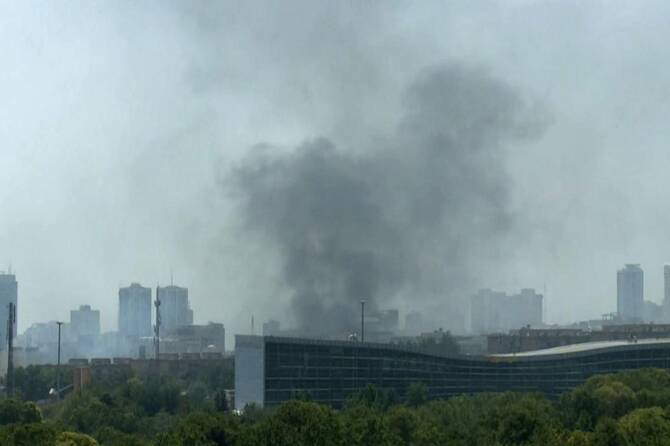TEHRAN: Israel hit Revolutionary Guard sites and Evin prison in Tehran on the 11th day of the war Monday, in what it said were its most powerful strikes yet on the Iranian capital.
Iran, in turn, fired missile barrages at Israel and vowed retaliation against the United States after American strikes on the Islamic republic’s nuclear sites a day earlier.
Loud explosions rocked Tehran, where Israeli Defense Minister Israel Katz said the military hit sites with “unprecedented force,” adding to speculation that it is seeking to topple Iran’s clerical leadership.
The targets included Evin prison, which Katz said “holds political prisoners and regime opponents,” as well as command centers for the domestic Basij paramilitary and the powerful Islamic Revolutionary Guard Corps.
Iranian media and the Israeli military said Israel also struck Fordo, a key nuclear enrichment facility buried deep in the mountains south of Tehran.
The military said it had struck Fordo on Monday “in order to obstruct access routes” to the site, which Israel’s ally the United States hit the previous day with massive bunker buster bombs.
President Donald Trump boasted that Sunday’s US strikes on three key sites had “obliterated” Iran’s nuclear capabilities, but other officials said it was too soon to assess the impact on Iran’s atomic program, which Israel and some Western states consider an unacceptable threat.
Sirens sounded across Israel on Monday and AFP journalists reported blasts over Jerusalem and people fleeing to shelters in Tel Aviv.
Iranian media said Israel’s strikes hit a power supply system in Tehran, triggering temporary outages.
In Israel, the national electricity company reported “damage near a strategic infrastructure facility” in the south that disrupted the power supply, without naming the location or specifying the cause.
Israel’s military censorship rules bar the publication of some details about damage in Israel.
Israeli strikes on Iran have killed more than 400 people, Iran’s health ministry has said. Iran’s attacks on Israel have killed 24 people, according to official figures.
After the US strikes, global markets reacted nervously, with oil prices jumping more than four percent early Monday but dipping later in the day.
China urged both Iran and Israel to prevent the conflict from spilling over, warning of potential economic fallout.
Iranian armed forces chief Abdolrahim Mousavi said in a video statement published on state TV that Washington’s bombing “will not go unanswered.”
“We will take firm action against the American mistake,” he added.
US Secretary of State Marco Rubio called on China to help deter Iran from closing the Strait of Hormuz, a chokepoint for one-fifth of the world’s oil supply.
The European Union’s foreign policy chief Kaja Kallas said closing the strategic strait would be “extremely dangerous.”
With Iran threatening US bases in the region, the State Department issued a worldwide alert cautioning Americans abroad.
In Bahrain, home to a major US naval base, the US embassy said it had “temporarily shifted a portion of its employees to local telework,” citing “heightened regional tensions.”
Meanwhile, international oil firms including BP and Total evacuated some of their foreign staff from southern Iraq, the state-owned Basra Oil Company said.
After the Pentagon stressed the goal of US intervention was not to topple the Iranian government, Trump openly toyed with the idea.
“If the current Iranian Regime is unable to MAKE IRAN GREAT AGAIN, why wouldn’t there be a Regime change???” Trump posted on his Truth Social platform.
His press secretary Karoline Leavitt said on Monday that Trump was “still interested and engaging in” diplomacy.
She suggested, however, that Iranians could overthrow their government if it did not agree to a diplomatic solution.
At a Pentagon press briefing, top US general Dan Caine said “initial battle damage assessments indicate that all three sites sustained extremely severe damage.”
Speaking ahead of a NATO summit this week, the alliance’s chief Mark Rutte said Tehran should not be allowed a nuclear weapon, calling it his “greatest fear,” while German Chancellor Friedrich Merz said “there is no reason to criticize what America did.”
Rafael Grossi, director of the International Atomic Energy Agency (IAEA), told an emergency meeting of the UN Security Council that craters were visible at the Fordo facility, but it had not been possible to assess the underground damage.
“Armed attacks on nuclear facilities should never take place,” he added.
Iran has consistently denied seeking an atomic bomb, and Grossi has said there was no evidence to suggest it was doing so despite the Islamic republic being the only non-nuclear armed state to enrich uranium to 60 percent.
The IAEA said on Monday that Tehran had informed it of “special measures to protect nuclear material” when the Israeli campaign began.
The UN agency also said it was seeking access to Iranian nuclear sites to “account for” stockpiles of highly enriched uranium.
Iranian Foreign Minister Abbas Araghchi, who met with Russian President Vladimir Putin on Monday, had accused the United States and Israel of deciding to “blow up” nuclear diplomacy with their attacks.













